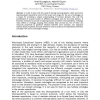112 search results - page 3 / 23 » Characterising Concept's Properties in Ontologies |
SOFTWARE
2002
13 years 6 months ago
2002
We consider the problem of characterisation of sequences of heterogeneous symbolic data that arise from a common underlying temporal pattern. The data, which are subject to impreci...
AAAI
2010
13 years 8 months ago
2010
Ontology matching is the problem of determining correspondences between concepts, properties, and individuals of different heterogeneous ontologies. With this paper we present a n...
APSEC
2000
IEEE
13 years 11 months ago
2000
IEEE
It has been recognised that formal methods are useful as a modelling tool in requirements engineering. Specification languages such as Z permit the precise and unambiguous modell...
KR
1998
Springer
13 years 11 months ago
1998
Springer
The paper investigates the characterisation of vague concepts within the framework of modal logic. This work builds on the supervaluation approach of Fine and exploits the idea of...
IBIS
2006
13 years 7 months ago
2006
In order to deal with the need of sharing learning objects within and across learning object repositories most of the recent work argue for the use of ontologies as a means for pro...

